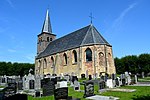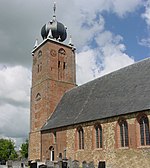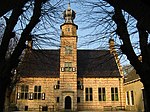Arkens, Franeker
FranekerHollow post mills in the NetherlandsRijksmonuments in FrieslandWindmills completed in 1972Windmills in Friesland ... and 1 more
Windpumps in the Netherlands

Arkens is a Hollow Post mill in Franeker, Friesland, Netherlands which has been restored to working order. The mill is listed as a Rijksmonument, number 15710.
Excerpt from the Wikipedia article Arkens, Franeker (License: CC BY-SA 3.0, Authors, Images).Arkens, Franeker
Ljochtewei, Waadhoeke
Geographical coordinates (GPS) Address Nearby Places Show on map
Geographical coordinates (GPS)
| Latitude | Longitude |
|---|---|
| N 53.187777777778 ° | E 5.7408333333333 ° |
Address
Ljochtewei
9033 WG Waadhoeke
Frisia, Netherlands
Open on Google Maps









